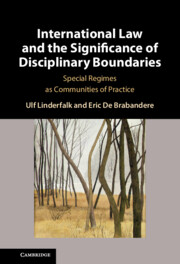Refine search
Actions for selected content:
6 results
2 - Special Regimes as Communities of Practice
-
- Book:
- International Law and the Significance of Disciplinary Boundaries
- Published online:
- 21 November 2024
- Print publication:
- 28 November 2024, pp 23-43
-
- Chapter
- Export citation
1 - The Concept of a Special Regime
-
- Book:
- International Law and the Significance of Disciplinary Boundaries
- Published online:
- 21 November 2024
- Print publication:
- 28 November 2024, pp 1-22
-
- Chapter
- Export citation
3 - A Mutual Engagement
-
- Book:
- International Law and the Significance of Disciplinary Boundaries
- Published online:
- 21 November 2024
- Print publication:
- 28 November 2024, pp 44-83
-
- Chapter
- Export citation
4 - A Joint Enterprise
-
- Book:
- International Law and the Significance of Disciplinary Boundaries
- Published online:
- 21 November 2024
- Print publication:
- 28 November 2024, pp 84-124
-
- Chapter
- Export citation

International Law and the Significance of Disciplinary Boundaries
- Special Regimes as Communities of Practice
-
- Published online:
- 21 November 2024
- Print publication:
- 28 November 2024
16 - Judicial Control of Arbitral Awards in Italy
- from Part IV - Judicial Control of Arbitral Awards
-
-
- Book:
- The Cambridge Handbook of Judicial Control of Arbitral Awards
- Published online:
- 08 October 2020
- Print publication:
- 29 October 2020, pp 257-274
-
- Chapter
- Export citation
